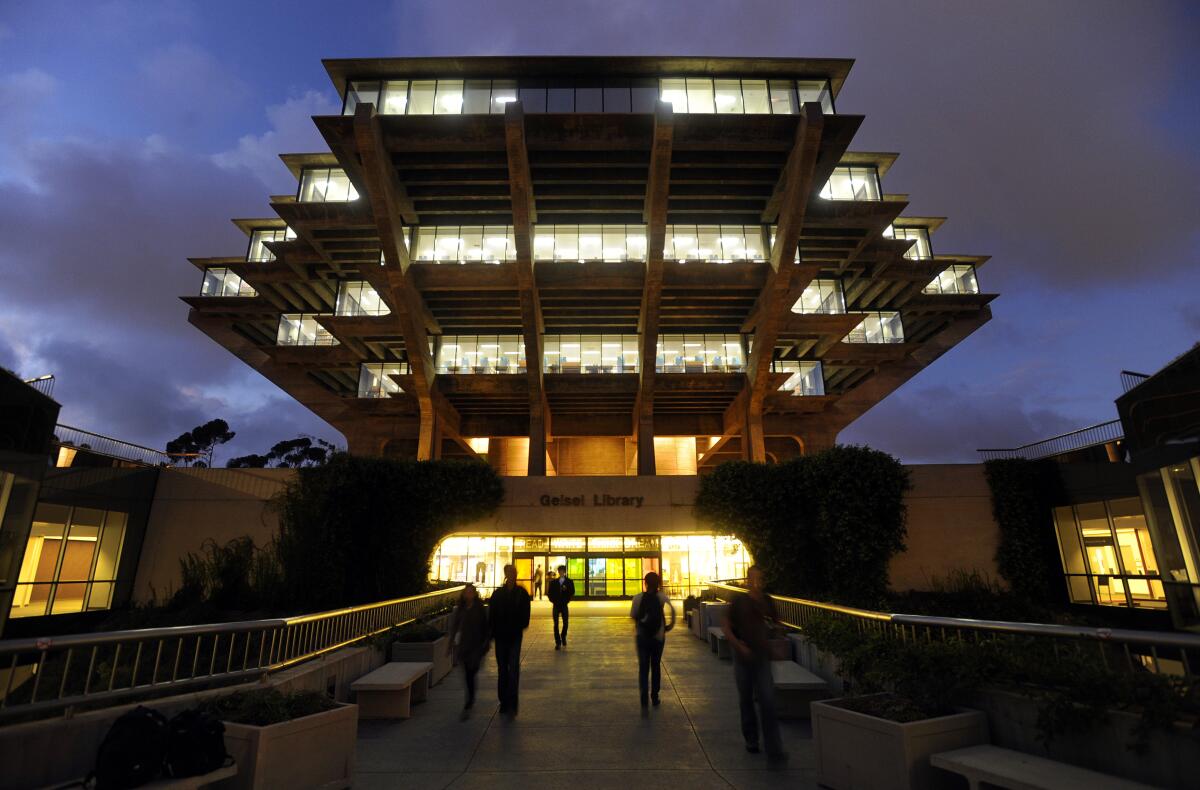Guest commentary: 4 ways for UC system to address social, economic and educational inequality

In the time of an unprecedented crisis that threatens the very nature of our safety and democracy, University of California health care professionals and researchers lead in confronting the deadly claim of the COVID-19 pandemic. This is an example of why the University of California was created some 150 years ago as a public land-grant institution to serve the needs of a nation.
There is reason to feel confident that UC scientists, in concert with peers around the world, will solve the mysteries about COVID-19 to allow everyone to return to a normal world.
That normal world contains one persistent historical challenge that remains unabated — the unequal educational opportunities for disenfranchised K-12 students. The extraordinarily low numbers of competitively eligible African American applicants, for instance, is typically addressed by UC in two ways.
First, an army of dedicated faculty and staff offers a range of outreach activities that inform underserved students about college admissions requirements and financial aid opportunities.
Second, as evidenced by the unanimous decision by UC regents in June to endorse Assemblywoman Shirley Weber’s ACA 5, our institution has sought to overturn or mitigate the deleterious effects of Proposition 209, which bans the use of race in UC admission considerations.
However, even before the passage of Proposition 209 in 1996, the enrollment of African American undergraduates was barely more than 4 percent of the entire UC student population; graduate school enrollments, particularly in STEM areas, were even worse.
We are gratified by the creativity and energy shown by colleagues in the first enterprise. Similarly, we concur with UC regents in the effort to roll back the intrusive effects of Proposition 209 on UC’s prerogative to admit and maintain a diverse student population and the free exchange of ideas and cultural experiences.
It is shortsighted, however, to think that these two strategies alone adequately address the hurdles faced by youngsters attending inner-city public schools. The University of California must more effectively lead in the grand reckoning taking place before our eyes in addressing social, economic and educational inequality.
We call for four deep-dive educational interventions that mirror past and present UC initiatives with industry and other public entities that have improved outcomes in agriculture, technology, space exploration and health care.
First, capitalize on former UC San Diego Provost Cecil Lytle’s inspired work to create the first college-prep K-12 model school. The Preuss School UC San Diego opened in 1999, which was quickly followed by Cal Prep at UC Berkeley and UCLA Community School. These model schools serve as “field stations” for testing the best K-12 educational practices for low-income students. Similar models should be instituted on every UC campus and in nearby communities to disseminate the best practices in high academic achievement for a particular region of the state.
Second, UC must increase the number of teacher preparation programs around the state, especially those that emphasize science and math instruction at all K-12 levels. In the 1980s, UC produced about a quarter of all teachers entering public education. That percentage now is in the single digits.
Third, as an effort that is vital to maintaining the quality of a UC education and the public good more generally, encourage legislation and public appreciation for the need to raise K-12 teachers’ salaries and benefits as well as public school support and accountability.
Last, and in order to promote public support and funding, help create a systemwide public policy center to develop, track and measure the impact of these new UC/K-12 innovations on the economic prosperity and social tranquillity across the state.
The UC system is the largest — and some would say the best — public university system in the nation. We encourage its leadership to think wisely and act boldly in addressing the seemingly intractable underachievement of African Americans in California’s K-12 public schools.
A rethink of the 1960 California Master Plan for Higher Education is called for — this time including an examination and assisting of K-12 as essential to claiming California’s economic future. Like our colleagues in the biomedical health sciences, UC must look beyond the immediate therapeutics to embrace its land-grant responsibility to remedy a circumstance that has endured far too long.
All the authors taught at UC San Diego. Joseph Watson is a professor emeritus in the chemistry department who lives in La Jolla. Hugh Mehan is a professor emeritus in the sociology department who lives in Encinitas. Peter Gourevitch is a professor emeritus in the political science department and the founding dean of the School of Global Policy & Strategy who lives in Solana Beach. This commentary was originally published by The San Diego Union-Tribune. ◆
Get the La Jolla Light weekly in your inbox
News, features and sports about La Jolla, every Thursday for free
You may occasionally receive promotional content from the La Jolla Light.